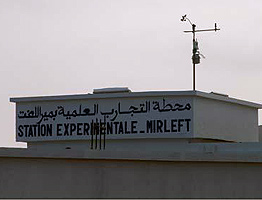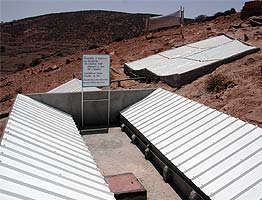
Development and environmental preservation are research areas to which the School’s PhD students are highly attentive. This is the case for Imad Lekouch, who devoted his PhD thesis to the production of drinking water by passive condensation of atmospheric humidity (dew) in Morocco. Through rigorous research work that benefited local communities, Imad Lekouch provided a practical, concrete response. His thesis was awarded the Prize for Best Research conferred by Ibn Zohr University in Agadir, Morocco.
A practical approach
For large parts of the rural areas of southwest Morocco, drinking water supply remains a problem, particularly for public institutions like schools and dispensaries. In deciding to study in situ the condensation of atmospheric humidity, Imad Lekouch evaluated an innovative method for recovering water. The first stage in the project was daily monitoring of the local climate parameters. The measurements proved the importance of the "resource" and provided the basis for predicting many "dew events."
Dew provides the equivalent of 40% of rainfall
Imad installed an experimental station in the village of Mirleft, south of Agadir . The aim was to measure the precise quantity of fresh water his process was capable of producing, before comparing it to the other resources available (fog and rain). The scientific investigation was combined with "a strong human experience," Imad CLAIMS, as he had to explain to villagers what he was doing, and win the support and assistance from the municipality, which made premises available for his use.
The implementation of a meteorological station, four condensers and a "fog harvesting net" made it possible to obtain data from May 2007 through the end of April 2008. During the year, many dew events were observed, and few fog events. "If dew occurs so frequently in the region," Imad explains, "it’s because of the high relative humidity (an average 75%), the clear skies, and air stagnation (with wind speed less than 4 meters per second). As a result, dew water represents some 40% of the annual contribution of rain and thus is an essential component of the overall water balance.
Usable water…
In terms of both yield and composition, analyses show that dew water has substantial potential as a supplementary resource. Rainwater and dew water both have fairly neutral pH and meet World Health Organization (WHO) requirements for drinking water, except for Mg2+ (magnesium) content, which is above the limit due to proximity to the ocean.

The success of the demonstration condenser led the team to install dew water collection systems at Idouasskssou, 8 km from Mirleft. This culminated in the deployment of three operational systems covering a total area of 135.7 m², and a fog harvesting net. The systems include:
– a flat terrace roof rebuilt over the top of a preexisting cistern,
– a two-slope roof installed over a preexisting cistern that was renovated to store the water collected,
– a ground-level condenser, whose very low cost means it can be installed on a very large scale,
– a 40 m² fog harvesting net, which was added in order to compare the relative collection of each resource, in the frequently damp marine air at night.
… put to good use
These installations made it possible to fill the reservoirs hitherto unused by the farmers As a result, free water is available for agricultural use in growing carob trees and the Opuntia genus of cactus (the nopal or prickly pear). Is this a technology for the other villages in the region? "That’s possible," says Imad, "because these are installations that will prove useful, and can easily be managed by the community".
Imad Lekouch: imadlekouch1@yahoo.fr
Daniel Beysens: daniel.beysens@espci.fr
The Communication Department at ESPCI ParisTech: codit@espci.fr
Unanimous acclaim for the research
Imad defended his thesis on February 23, 2010. At Ibn Zohr University, the jury awarding the Prize for Best Research noted the quality of the work, the specific environmental nature of the topic, and the considerable number of articles concerning the research. What comes next? Imad Lekouch plans to pursue a career in research.
To learn more:
Imad studied under the direction of Daniel Beysens, a researcher in the Physics and Mechanics of Heterogeneous Media laboratory (PMMH ).
His PhD thesis was completed under the joint supervision of Université Pierre et Marie Curie (UPMC) and Ibn Zohr University (Morocco), and in collaboration with the CEA/CNRS/ESPCI ParisTech team in Paris (France), UMR CNRS 6134 in Ajaccio (France), and the OPUR Association (France).